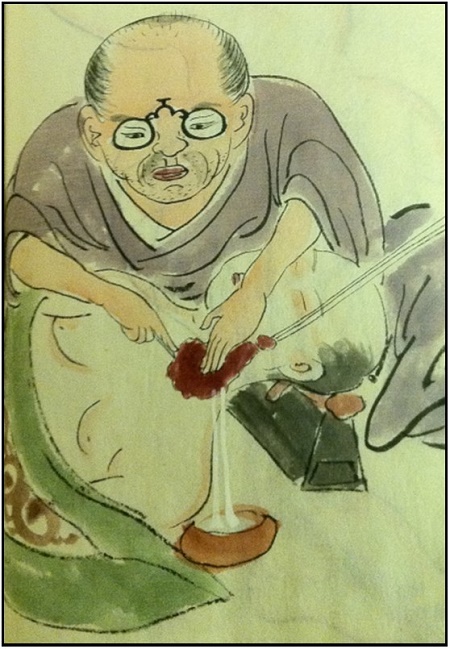Post contributed by Roger Peña, Trent History of Medicine Intern for 2021-2022, and Rachel Ingold, Curator of the History of Medicine Collections.

Tell us a bit about yourself.
I’m Roger, and I grew up in the Boston area. I attended Syracuse University as an undergraduate and earned a Master’s degree in education at Lesley University in Massachusetts. I moved down to North Carolina in 2013 and have served as an educator in private and public schools. I’m currently in my last year at UNC Greensboro’s MLIS program with a specialization in special collections and archives.
My wife and I have two children—ages 3 and 2 months—and we live in Durham. I love all things history and our house is filled with books and magazines related to several historic topics. I really love to cook and try new recipes. We are HUGE Boston sports fans so you will usually find us watching one of my sports teams on TV.
What interests you in working in a library setting, specifically in the History of Medicine Collections?
I’m 35 and a career changer. I had always thought about going back to school to earn an MLIS but never thought I had the time. The COVID-19 pandemic, school closures, and having some extra time to think about career goals rekindled my interest in earning my degree. I’ve always wanted to work in special collections and archives and hope to continue this work after graduation.
As a teenager, I “lived” at libraries and museums in my hometown of Boston. I love studying all things history and being able to handle old artifacts and primary sources—holding history in my hand! I’m that person at museums and historic sites asking questions, trying to touch everything and reading as many labels as possible. Being a history teacher, sharing stories of the past, and having students research and explore topics that interest them has always been important to me.
I love reading, instruction and all things history so I jumped at the chance to work at the Rubenstein Library. The history of medicine is always present when studying other historic topics and the History of Medicine (HoM) collection encompasses that. Even after months as the HoM intern, I’m still blown away by how vast and diverse the History of Medicine collection is and how much it has to offer. I’ve been able to hold manuscripts, artifacts, and books that are centuries old. There’s a special feeling when you pick up these resources; and you can’t help but feel a connection to the past and the individuals who used or created these materials.
The Josiah C. Trent HoM Internship has allowed me to explore the research aspect of special collections; and I’ve also been able to create and plan exhibits, helped with reference services and instructional support, and collaborated with other collections at the Rubenstein Library! It’s been a fantastic learning experience.
Can you share a memorable experience from your internship?
It’s really hard to choose just one memorable experience. I’ve enjoyed getting to know other Rubenstein Library staff and meeting researchers from across the world. Walking into the stacks makes me feel right at home and I always have to take a step back and appreciate how special the collection is. Being able to immerse yourself with the material and learning the ins and outs of academic libraries has been especially rewarding.
Participating and helping to coordinate Anatomy Day and researching and curating physical and online exhibits, like Good Vibrations, have been just a few of my favorite moments. Helping with instructional support is always fun as I was able to combine my past experience as an educator and help students interact with primary sources. It’s always fun to see a student’s reaction when something has caught their interest.

Do you have a favorite item you would like to share?
Again, hard to choose just one. The anatomical flap books and the Four Seasons are quite a sight to see and exemplify how people have always had a curiosity to touch and personally interact with materials. I really loved the East Asian medical books featured at Anatomy Day: Shunrinken kasho (Shunrinken school family book) from the Japanese medical manuscripts notebooks and Shinkan Geka Seisō 新刊外科正宗. The illustrations in these books are phenomenal.
The amputation set from the mid-19th century has probably been the item I spent the most time with. It’s one of those artifacts that you can’t help but want to learn more about. Being a student of American history and an aficionado of learning about the Civil War, the amputation set from the mid 19th century called my name. I first came across the saw when I was assisting Dr. Jeff Baker and Brooke Guthrie with a History of Surgery class and Dr. Baker asked me if I could handle student questions related to Civil War medicine – which I was more than happy to do!
I was fortunate enough to have a blog post published on The Devil’s Tale and Duke Daily where I was able to investigate the history of the saw and its origins. Holding the amputation saw in your hand, you can easily imagine a world where physicians grappled with decisions regarding the need for an amputation and the thousands of soldiers whose lives were forever changed by the war and surgical procedure. It was an eye-opening experience and allowed me to explore the unique but very complicated role that North Carolina played in the Civil War.



It was wonderful reading about Roger’s journey through the History of Medicine Collection as the JC Trent Intern. His thoughts on the Civil War medicine and amputations with consideration of NC’s role in the war were most interesting.
Good Luck to you, Roger, for a happy career.
Rebecca Trent Kirkland